Reflective Essay: Personal Reflections on the Stolen Generation
VerifiedAdded on 2022/08/27
|5
|1064
|21
Essay
AI Summary
This reflective essay delves into the harrowing history of the Stolen Generation, focusing on the forced removal of Aboriginal and Torres Strait Islander children from their families by the Australian government between 1905 and 1967. The essay explores the author's emotional response to this history, discussing the impact of the assimilation policies, the loss of cultural identity, and the lasting trauma experienced by those affected. The author reflects on the systemic injustices, the health disparities, and the importance of culturally sensitive interactions with Indigenous communities. The essay also provides an action plan for promoting awareness and improving the quality of life for the Stolen Generation. The author emphasizes the need for legal and social policies to address the ongoing issues and provide support for those affected by these events.
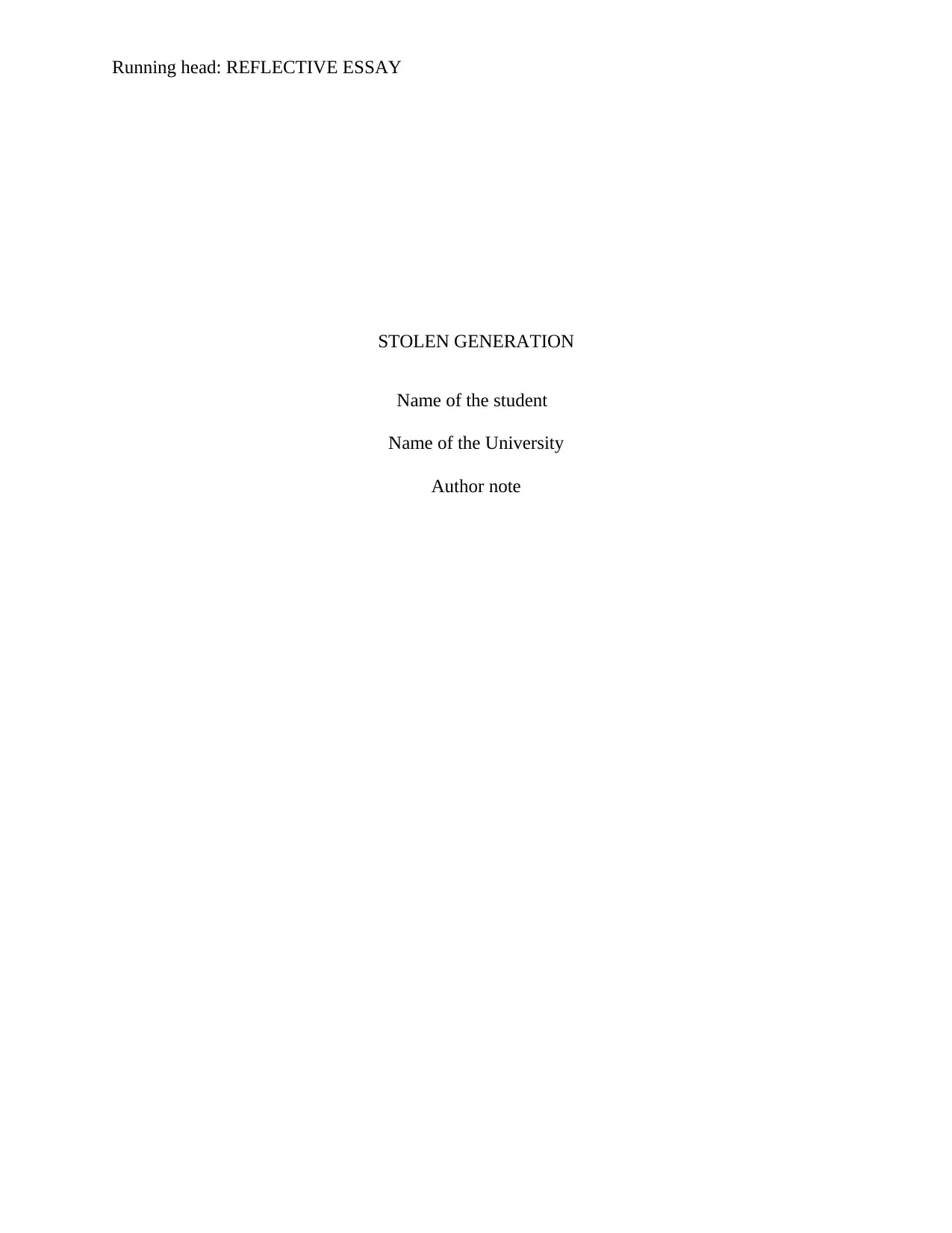
Running head: REFLECTIVE ESSAY
STOLEN GENERATION
Name of the student
Name of the University
Author note
STOLEN GENERATION
Name of the student
Name of the University
Author note
Paraphrase This Document
Need a fresh take? Get an instant paraphrase of this document with our AI Paraphraser
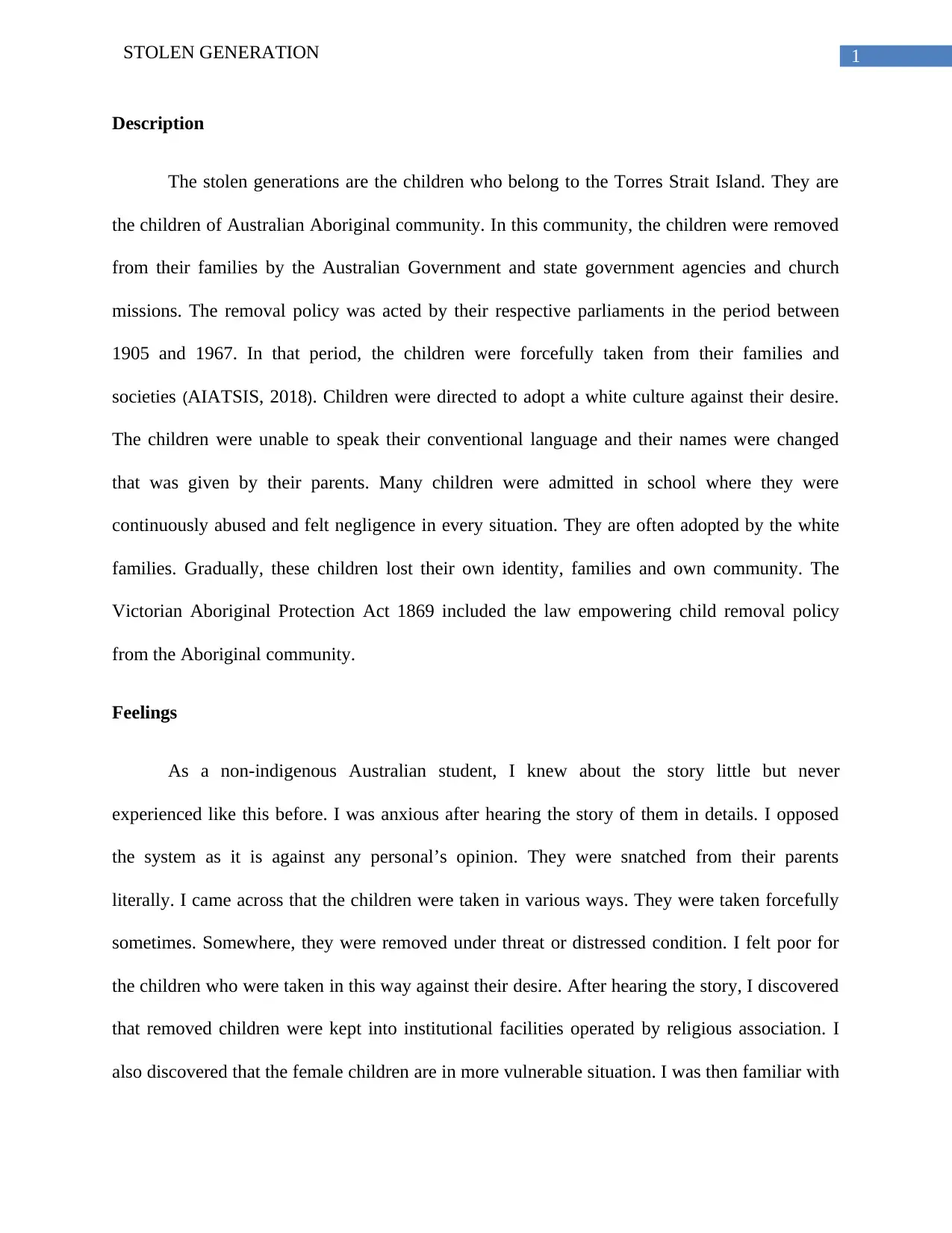
1STOLEN GENERATION
Description
The stolen generations are the children who belong to the Torres Strait Island. They are
the children of Australian Aboriginal community. In this community, the children were removed
from their families by the Australian Government and state government agencies and church
missions. The removal policy was acted by their respective parliaments in the period between
1905 and 1967. In that period, the children were forcefully taken from their families and
societies (AIATSIS, 2018). Children were directed to adopt a white culture against their desire.
The children were unable to speak their conventional language and their names were changed
that was given by their parents. Many children were admitted in school where they were
continuously abused and felt negligence in every situation. They are often adopted by the white
families. Gradually, these children lost their own identity, families and own community. The
Victorian Aboriginal Protection Act 1869 included the law empowering child removal policy
from the Aboriginal community.
Feelings
As a non-indigenous Australian student, I knew about the story little but never
experienced like this before. I was anxious after hearing the story of them in details. I opposed
the system as it is against any personal’s opinion. They were snatched from their parents
literally. I came across that the children were taken in various ways. They were taken forcefully
sometimes. Somewhere, they were removed under threat or distressed condition. I felt poor for
the children who were taken in this way against their desire. After hearing the story, I discovered
that removed children were kept into institutional facilities operated by religious association. I
also discovered that the female children are in more vulnerable situation. I was then familiar with
Description
The stolen generations are the children who belong to the Torres Strait Island. They are
the children of Australian Aboriginal community. In this community, the children were removed
from their families by the Australian Government and state government agencies and church
missions. The removal policy was acted by their respective parliaments in the period between
1905 and 1967. In that period, the children were forcefully taken from their families and
societies (AIATSIS, 2018). Children were directed to adopt a white culture against their desire.
The children were unable to speak their conventional language and their names were changed
that was given by their parents. Many children were admitted in school where they were
continuously abused and felt negligence in every situation. They are often adopted by the white
families. Gradually, these children lost their own identity, families and own community. The
Victorian Aboriginal Protection Act 1869 included the law empowering child removal policy
from the Aboriginal community.
Feelings
As a non-indigenous Australian student, I knew about the story little but never
experienced like this before. I was anxious after hearing the story of them in details. I opposed
the system as it is against any personal’s opinion. They were snatched from their parents
literally. I came across that the children were taken in various ways. They were taken forcefully
sometimes. Somewhere, they were removed under threat or distressed condition. I felt poor for
the children who were taken in this way against their desire. After hearing the story, I discovered
that removed children were kept into institutional facilities operated by religious association. I
also discovered that the female children are in more vulnerable situation. I was then familiar with
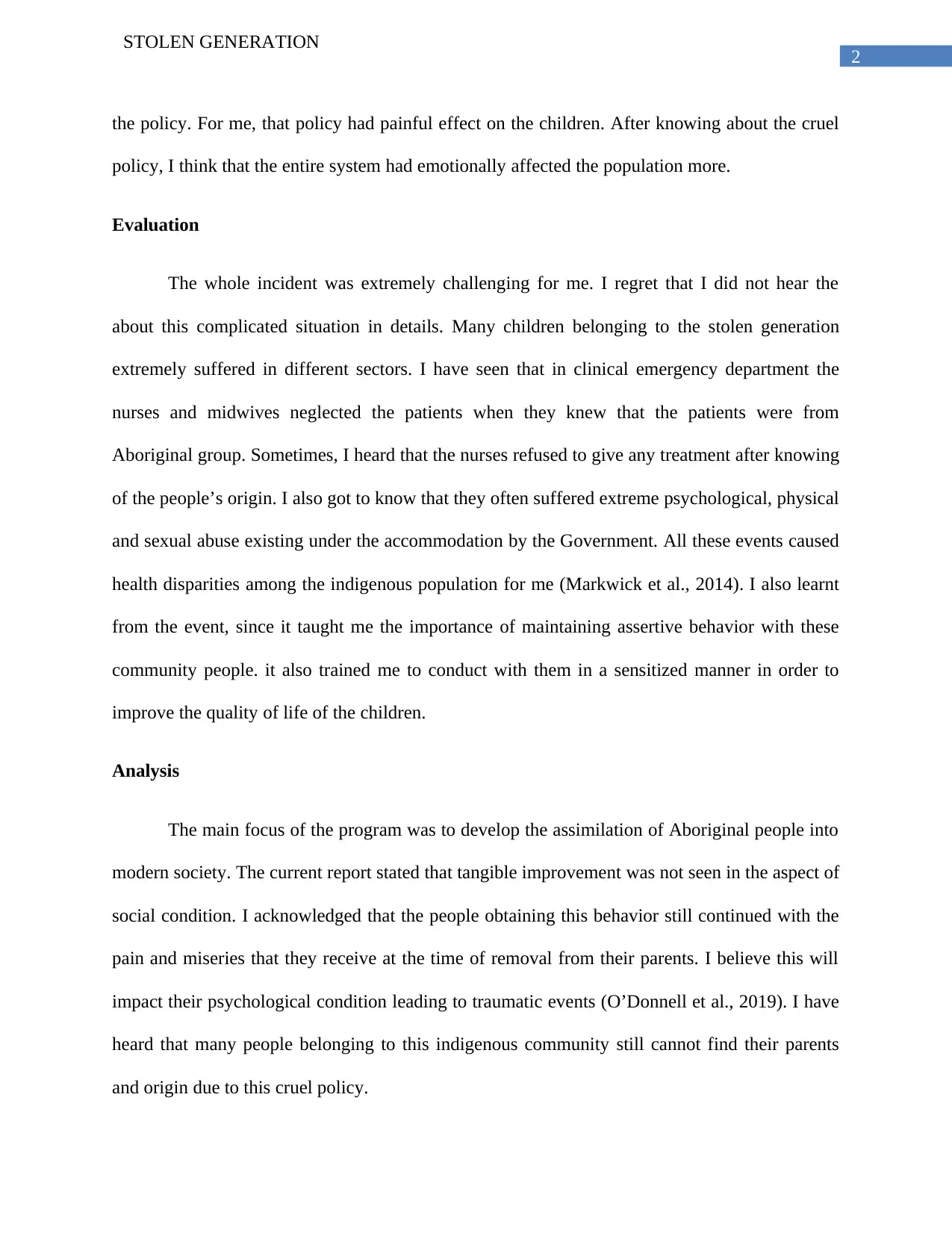
2
STOLEN GENERATION
the policy. For me, that policy had painful effect on the children. After knowing about the cruel
policy, I think that the entire system had emotionally affected the population more.
Evaluation
The whole incident was extremely challenging for me. I regret that I did not hear the
about this complicated situation in details. Many children belonging to the stolen generation
extremely suffered in different sectors. I have seen that in clinical emergency department the
nurses and midwives neglected the patients when they knew that the patients were from
Aboriginal group. Sometimes, I heard that the nurses refused to give any treatment after knowing
of the people’s origin. I also got to know that they often suffered extreme psychological, physical
and sexual abuse existing under the accommodation by the Government. All these events caused
health disparities among the indigenous population for me (Markwick et al., 2014). I also learnt
from the event, since it taught me the importance of maintaining assertive behavior with these
community people. it also trained me to conduct with them in a sensitized manner in order to
improve the quality of life of the children.
Analysis
The main focus of the program was to develop the assimilation of Aboriginal people into
modern society. The current report stated that tangible improvement was not seen in the aspect of
social condition. I acknowledged that the people obtaining this behavior still continued with the
pain and miseries that they receive at the time of removal from their parents. I believe this will
impact their psychological condition leading to traumatic events (O’Donnell et al., 2019). I have
heard that many people belonging to this indigenous community still cannot find their parents
and origin due to this cruel policy.
STOLEN GENERATION
the policy. For me, that policy had painful effect on the children. After knowing about the cruel
policy, I think that the entire system had emotionally affected the population more.
Evaluation
The whole incident was extremely challenging for me. I regret that I did not hear the
about this complicated situation in details. Many children belonging to the stolen generation
extremely suffered in different sectors. I have seen that in clinical emergency department the
nurses and midwives neglected the patients when they knew that the patients were from
Aboriginal group. Sometimes, I heard that the nurses refused to give any treatment after knowing
of the people’s origin. I also got to know that they often suffered extreme psychological, physical
and sexual abuse existing under the accommodation by the Government. All these events caused
health disparities among the indigenous population for me (Markwick et al., 2014). I also learnt
from the event, since it taught me the importance of maintaining assertive behavior with these
community people. it also trained me to conduct with them in a sensitized manner in order to
improve the quality of life of the children.
Analysis
The main focus of the program was to develop the assimilation of Aboriginal people into
modern society. The current report stated that tangible improvement was not seen in the aspect of
social condition. I acknowledged that the people obtaining this behavior still continued with the
pain and miseries that they receive at the time of removal from their parents. I believe this will
impact their psychological condition leading to traumatic events (O’Donnell et al., 2019). I have
heard that many people belonging to this indigenous community still cannot find their parents
and origin due to this cruel policy.
⊘ This is a preview!⊘
Do you want full access?
Subscribe today to unlock all pages.

Trusted by 1+ million students worldwide
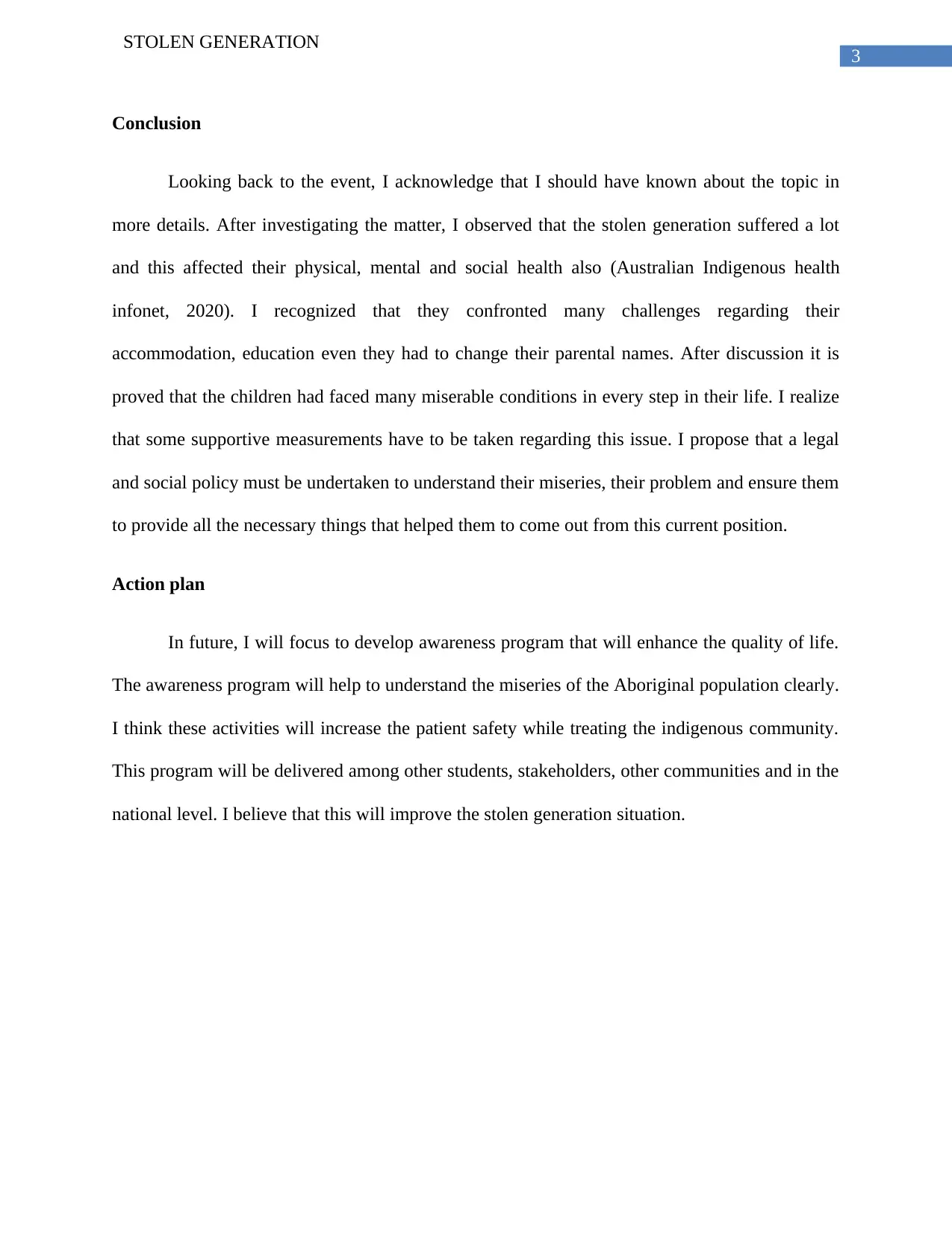
3
STOLEN GENERATION
Conclusion
Looking back to the event, I acknowledge that I should have known about the topic in
more details. After investigating the matter, I observed that the stolen generation suffered a lot
and this affected their physical, mental and social health also (Australian Indigenous health
infonet, 2020). I recognized that they confronted many challenges regarding their
accommodation, education even they had to change their parental names. After discussion it is
proved that the children had faced many miserable conditions in every step in their life. I realize
that some supportive measurements have to be taken regarding this issue. I propose that a legal
and social policy must be undertaken to understand their miseries, their problem and ensure them
to provide all the necessary things that helped them to come out from this current position.
Action plan
In future, I will focus to develop awareness program that will enhance the quality of life.
The awareness program will help to understand the miseries of the Aboriginal population clearly.
I think these activities will increase the patient safety while treating the indigenous community.
This program will be delivered among other students, stakeholders, other communities and in the
national level. I believe that this will improve the stolen generation situation.
STOLEN GENERATION
Conclusion
Looking back to the event, I acknowledge that I should have known about the topic in
more details. After investigating the matter, I observed that the stolen generation suffered a lot
and this affected their physical, mental and social health also (Australian Indigenous health
infonet, 2020). I recognized that they confronted many challenges regarding their
accommodation, education even they had to change their parental names. After discussion it is
proved that the children had faced many miserable conditions in every step in their life. I realize
that some supportive measurements have to be taken regarding this issue. I propose that a legal
and social policy must be undertaken to understand their miseries, their problem and ensure them
to provide all the necessary things that helped them to come out from this current position.
Action plan
In future, I will focus to develop awareness program that will enhance the quality of life.
The awareness program will help to understand the miseries of the Aboriginal population clearly.
I think these activities will increase the patient safety while treating the indigenous community.
This program will be delivered among other students, stakeholders, other communities and in the
national level. I believe that this will improve the stolen generation situation.
Paraphrase This Document
Need a fresh take? Get an instant paraphrase of this document with our AI Paraphraser
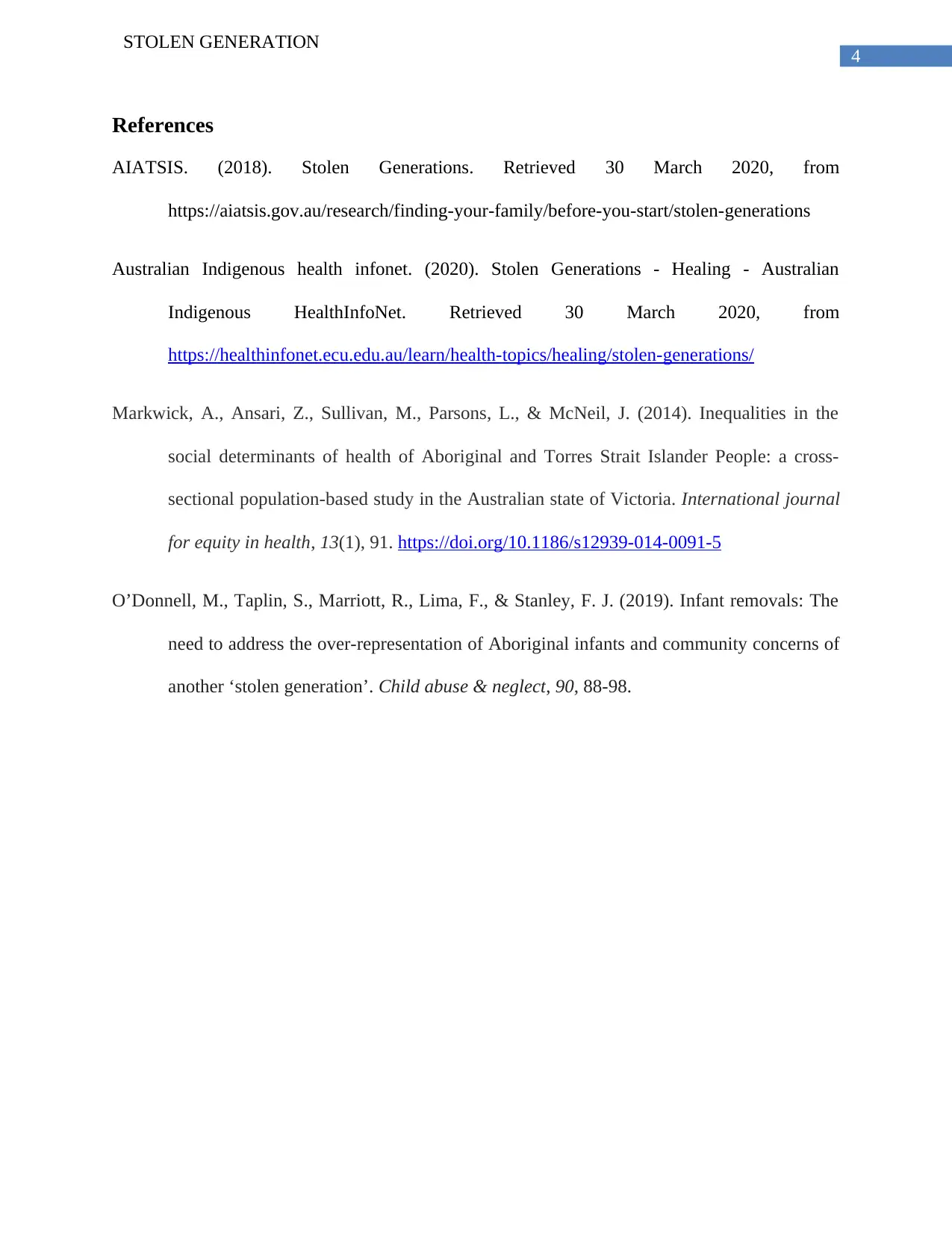
4
STOLEN GENERATION
References
AIATSIS. (2018). Stolen Generations. Retrieved 30 March 2020, from
https://aiatsis.gov.au/research/finding-your-family/before-you-start/stolen-generations
Australian Indigenous health infonet. (2020). Stolen Generations - Healing - Australian
Indigenous HealthInfoNet. Retrieved 30 March 2020, from
https://healthinfonet.ecu.edu.au/learn/health-topics/healing/stolen-generations/
Markwick, A., Ansari, Z., Sullivan, M., Parsons, L., & McNeil, J. (2014). Inequalities in the
social determinants of health of Aboriginal and Torres Strait Islander People: a cross-
sectional population-based study in the Australian state of Victoria. International journal
for equity in health, 13(1), 91. https://doi.org/10.1186/s12939-014-0091-5
O’Donnell, M., Taplin, S., Marriott, R., Lima, F., & Stanley, F. J. (2019). Infant removals: The
need to address the over-representation of Aboriginal infants and community concerns of
another ‘stolen generation’. Child abuse & neglect, 90, 88-98.
STOLEN GENERATION
References
AIATSIS. (2018). Stolen Generations. Retrieved 30 March 2020, from
https://aiatsis.gov.au/research/finding-your-family/before-you-start/stolen-generations
Australian Indigenous health infonet. (2020). Stolen Generations - Healing - Australian
Indigenous HealthInfoNet. Retrieved 30 March 2020, from
https://healthinfonet.ecu.edu.au/learn/health-topics/healing/stolen-generations/
Markwick, A., Ansari, Z., Sullivan, M., Parsons, L., & McNeil, J. (2014). Inequalities in the
social determinants of health of Aboriginal and Torres Strait Islander People: a cross-
sectional population-based study in the Australian state of Victoria. International journal
for equity in health, 13(1), 91. https://doi.org/10.1186/s12939-014-0091-5
O’Donnell, M., Taplin, S., Marriott, R., Lima, F., & Stanley, F. J. (2019). Infant removals: The
need to address the over-representation of Aboriginal infants and community concerns of
another ‘stolen generation’. Child abuse & neglect, 90, 88-98.
1 out of 5
Related Documents
Your All-in-One AI-Powered Toolkit for Academic Success.
+13062052269
info@desklib.com
Available 24*7 on WhatsApp / Email
![[object Object]](/_next/static/media/star-bottom.7253800d.svg)
Unlock your academic potential
Copyright © 2020–2026 A2Z Services. All Rights Reserved. Developed and managed by ZUCOL.





